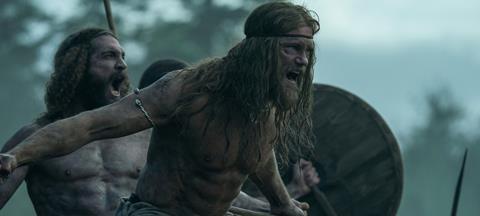The graphic violence of Robert Eggers’ latest blockbuster may make it a hard watch for many Christians. But among the brutality, Nick Mance found a strong reminder of the consequences of free will and the grace of God

“Your fate is set and you cannot escape it.” These are the words spoken over young Amleth, the titular character in Robert Eggers’ new movie The Northman. But despite the star-studded cast, and having all the right ingredients for a classic revenge tale, the film is far from your standard Hollywood fare.
Amleth, played by co-producer Alexander Skarsgård, proceeds to snarl and slash his way through a bleak and barbaric landscape, spilling more blood than words on his quest for vengeance. He is a hero that it is very hard to cheer on. Light and dark are woven into impressive visuals, but the narrative is morally grey and the themes unflinchingly pagan; viewers are invited to immerse themselves in a pre-Christianised culture where might is right and blood paves the way to heaven.
Clear choices
Despite the ominous words about his inescapable fate, Amleth is presented with a clear choice in the film: kindness for his kin or hate for his enemies. “I choose both,” he announces, rather bewilderingly, and storms off to do some more killing, en route to claiming his bloody place in Valhalla and leaving his children fatherless – though perhaps that was indeed a kindness.
Had he only learned that mercy triumphs over judgement, perhaps his story would have ended differently
In what is (very) arguably the most gruesome scene in the movie, Jesus gets a mention, as the “crucified corpse” worshipped by the Christians. It is the crudest and briefest breath of fresh air – a reminder of the God of mercy and forgiveness – before the narrative nose-dives back into massacre.
From the comfort of a reclining cinema seat, such a world can feel a million miles away and, fortunately, few will go away inspired by Amleth’s life choices. Doubtless we have the culture-shifting influence of the crucified God to thank for that and, in humility, I emerged from two hours of graphic brutality realising: But for the grace of God, there go I.
Basic instincts
Ruling over the beasts of the earth is part of the human vocation, as given to us by God in Genesis 1. But, by the time we get to Genesis 4, the beast called “sin” has reared its head. The rest, as they say, is history. To this day, humans are caught in the struggle between becoming like beasts, slaves to their animal instincts, or ruling over them. Never have I seen this so starkly portrayed as in The Northman, where throaty rituals are performed to invoke a bestial mindset in warriors before battle. This is what happens when beast rules over man.
Born into a world of violence and vengeance, Amleth is a product of his time, becoming a violent and vengeful man himself. He receives several visions of a living family tree, with kings past and present sprouting off as branches and, in that image, I saw how much we are influenced by those who came before us. It would be easy to distance ourselves from the barbarism of history but humanity, too, is a family tree, each branch stemming from the ones before. We are born, ready to be shaped for good or ill by the world we enter, which itself has been shaped by those who came before.
In Romans 5:12, Paul reminds us that sin entered into the world through one man. But before we, like Adam, blame others for our poor decisions, we need to face up to the reality that we also face the same choices: to trust God and choose the way of life or defy God, seizing upon whatever looks good in our own eyes. That way leads to death, warns God, and The Northman is a case in point.
I emerged from two hours of graphic brutality realising: But for the grace of God, there go I
“A shoot will come up from the stump of Jesse; from his roots a branch will bear fruit,” says Isaiah 11:1. It is a reminder that one branch alone bore the untainted fruit of life. And unless this good branch had fallen to the ground and died it would have remained alone. But die it did, and on the third day, sprouted up anew.
A different way
While clinging to the tree of Adam, humanity will continue to rage and plot in vain to forge kingdoms in its own corrupt likeness. For any chance of life, we must die to ourselves and fall, like dried-up twigs, to the ground. Only then, by God’s mercy, can we be grafted afresh into Jesus, in whom we can at last produce the fruit of life.
Metaphors are, of course, simplified ways of talking about what is, in reality, far more complicated. But just as Christians are influenced by the world so, too, the world has been influenced by the bearers of God’s kingdom. Reluctant as a post-Christian culture may be to admit it, those virtues that we often take for granted, such as championing the weak and oppressed, were delivered to us through the branches that came before; hundreds of years of Christ-followers choosing the way of life over the way of the beast.
Alas, for poor Amleth – and all the real humans in history like him – he is bound to gods who demand blood, rather than the one who shed his own. Had he only learned that mercy triumphs over judgement, perhaps his story would have ended differently.




































